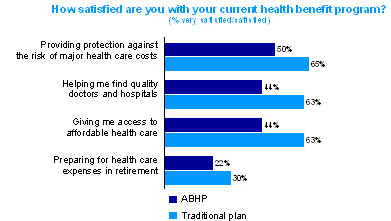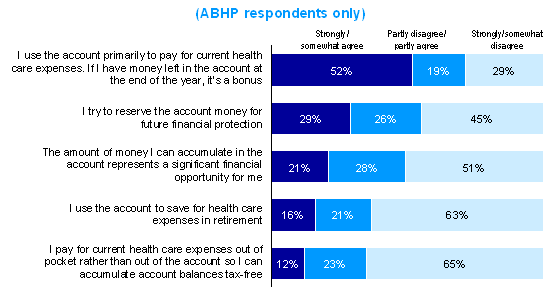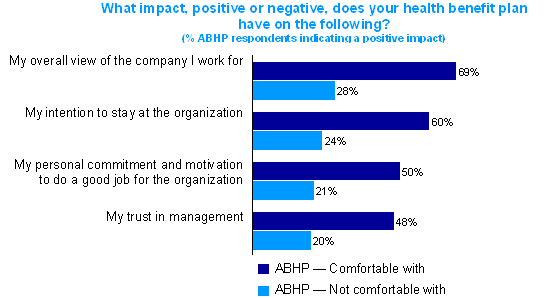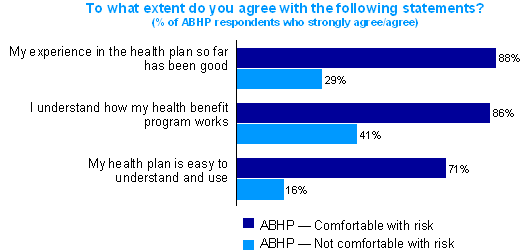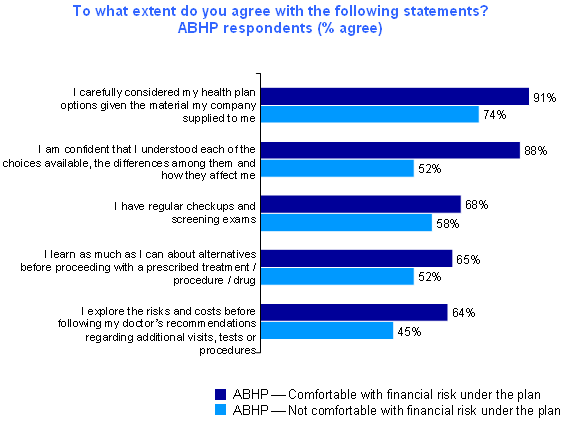| For
Information: Joe Conway Towers Perrin (914) 745-4175 joseph.p.conway@towersperrin.com |
|
|
FOR IMMEDIATE RELEASE Without the Correct Approach and Implementation, Long-Term Effectiveness of Account-Based Health Plans Could Be Undermined, Towers Perrin Research Shows New Study Shows That Employees Lack Competency, Comfort, Understanding and Satisfaction With Account-Based Health Plans STAMFORD, CT., May 22, 2007¾ Despite the short-term financial savings achieved by some employers, new Towers Perrin research shows that the long-term effectiveness of account-based health plans (ABHPs), or "consumer-driven health plans," may be in question. According to the newly released 2007 Towers Perrin Study on Account-Based Health Plans, employers and employees are not reaping ABHPs' full rewards. Employees currently enrolled in ABHPs are significantly less satisfied with many elements of the health benefit plan compared to those enrolled in traditional health benefit plans. And efforts by employers and health plans to date have not strengthened employeesf confidence and competence as health care consumers. But, more encouraging, the research also shows that when employees do have a strong understanding of their ABHP and feel comfortable with the level of perceived financial risk associated with it, they better utilize the plan and its resources, thus becoming better health care consumers. Analyzing ABHPs After the First Years of Meaningful
Experience "The Towers Perrin research is the first study to analyze ABHPs after several years of meaningful experience and to compare responses from ABHP members and traditional plan members," said Dave Guilmette, Managing Director of Towers Perrinfs Health and Welfare practice. "Our intent was to identify the plan features that best influence employee attitudes and consumer behaviors and that best attract participants. We were surprised to find that employees' attitudes and behaviors were less affected by plan features than by other employer practices. Employees have been affected more on an emotional level than a rational level ¾ and not always positively." As compared to traditional health benefit plan participants, ABHP members are less comfortable with the level of financial risk their plan exposes them to, less likely to understand how the plan works, less favorable about how easy it is to use the plan, less favorable about the clarity of communication around benefit change and less satisfied with the basic elements of their plans -- including access to affordable, quality health care (Exhibit 1).
"Quite startlingly, ABHP members are significantly less satisfied than those in traditional health benefit plans, when in fact they shouldn't be. Employees are using a traditional yardstick to measure these plans but, frankly, employers need to give them a new yardstick," continued Guilmette. "ABHP members often have access to the same provider networks as those in the traditional health plans, with the added benefits of being able to save for future medical expenses, but the overall perception on the part of employees is that ABHPs are cheaper and inferior plans. The employees' views suggest a lack of trust in employer practices and motives surrounding the introduction of ABHP plan options. Clearly, employers need to recondition employees to appreciate a longer-term view of their health benefits and to help them understand that ABHPs are not lesser plans." A Nation of Spenders, Not Savers According to the Towers Perrin survey, while 29% try to reserve account money for future financial protection, and 16% use the ABHP to save for health care expenses in retirement (see Exhibit 2), the majority of participants have yet to fully-appreciate the value of this opportunity.
"Contrary to the designed purpose of ABHPs, employees do not appreciate the long-term potential these savings accounts hold and remain mired in the old 'use it or lose it' mentality of flexible spending accounts," commented Guilmette. "If this perception is not changed quickly, employees will be missing out on a critical benefit, and the intended financial incentives will not work correctly. One of the keys to changing this perception is for employers to help employees plan for and manage financial risk as part of the transition to decision-making responsibility that comes with enrolling in an ABHP." Unless employee attitudes improve, it is not realistic to expect that the ABHP approach will attract a majority of employees, nor will the experience enhance their commitment to their employers. On the contrary, continuation of the present views could lead to resistance by employees and detract from their commitment. Are Account-based Health Plan Supporters Premature in
Declaring Success? But Towers Perrin research also raises the question of whether previous studies have been measuring program performance in ways that tell the full story. The long-term success of ABHPs depends on more than the financial incentives implicit in the plan design and, while these plans have achieved some short-term cost savings, employees still lack competency, comfort, understanding and satisfaction with the plans. This general lack of satisfaction, awareness and understanding around ABHPs is a significant barrier to good long-term consumer behavior and positive change on the part of employees. "ABHPs have lowered health care costs for employers but the widespread confusion and dissatisfaction reported by employees are key indicators that the conditions for long-term success are not yet in place," said Guilmette."Any consumer product that scored as low as ABHPs do in terms of customer satisfaction and understanding would be significantly retooled or pulled from the shelves. Therefore, Towers Perrin hopes this research serves as a wake-up call to employers and health plans, and strongly encourages them to address employee concerns with ABHPs, now. Otherwise, the promise ABHPs hold will not be realized." Failure -- or even the suboptimal performance -- of ABHPs can have serious consequences for employees and employers alike. For employees it means that they would be prevented from experiencing the important benefits (such as accumulating money for retiree health care) associated with ABHPs. For employers, the mistrust that would be created has negative consequences for the company's internal brand that go far beyond the benefit program in its effect on productivity (see Exhibit 3). For example, 50% of ABHP members who are comfortable with their financial risk say that their health plan impacts their personal commitment and motivation to do a good job for the organization vs. 21% of ABHP members who are uncomfortable with their financial risk.
Realizing the Long-term Promise of Account-based Health
Plans However, the survey shows that when employees have an understanding how their ABHP works and feel comfortable with the level of financial risk associated with it, they more actively utilize the plan and its resources, and become smarter health care consumers (see Exhibits 4 and 5). For example, 88% of ABHP members who are comfortable with their level of financial risk feel their experience in the health plan so far has been good, versus 29% of those who are uncomfortable, and 86% of ABHP members who are comfortable with their level of financial risk understand how their health plan works versus 41% of those who are uncomfortable.
"Employers have not sufficiently changed their communication style or methods to correspond to the new health plans and, in fact, often continue to communicate in the same ways that have historically marked employee benefit plans," said Guilmette. "Although employees are expected to fully understand their financial obligations under the new plans, many employers are wary of creating discomfort or confusion. Therefore, employers often take a minimalist approach to informing employees of the details or intricacies of the plans. But the unintended result is that employees feel even more uncomfortable and confused by the plans, and cannot reap the full benefits of the plans." Towers Perrin research shows that employer-employee communication regarding ABHPs is the most significant issue impacting the success of ABHPs today. Conversely, the survey data show that ABHP plan features have little bearing, positively or negatively, on how an employee perceives the plan. This does not mean that plan structure is irrelevant but, before a planfs structure can impact behavior, it must be properly understood. To truly realize the benefits of ABHPs, employers must:
The result will be an employee population that understands their health benefit plan and is more confident, assertive and empowered to make smarter health decisions. "Employers have already accomplished many things with ABHPs, but still have a long way to go. Employers now need to refocus their efforts toward shifting the employee mindset about ABHPs to achieve sustainable success. The stakes are just too high for employers to do otherwise," said Guilmette. About Towers Perrin |
